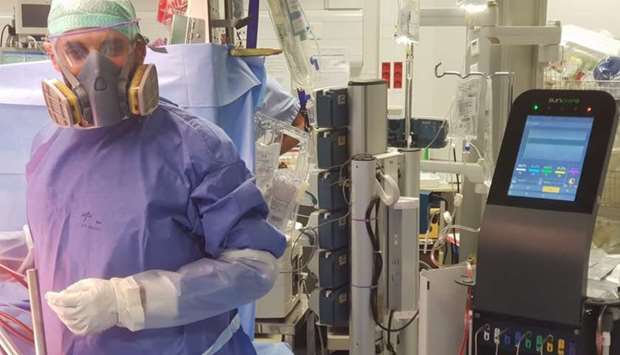A doctor at Weill Cornell Medicine – Qatar (WCM-Q) wants to bring an innovative form of surgery for ovarian cancer to the country in the hope of improving survival rates among women.
Dr Arash Rafii Tabrizi, professor of genetic medicine in obstetrics and gynaecology at WCM-Q, recently took part in a new surgical protocol in France that has only been in use for a few months.
Doctors believe that it may improve the survival rate of patients with ovarian cancer and Dr Rafii Tabrizi would like to work with local stakeholders to set up an innovative programme for advanced ovarian cancer management and introduce the new personalised medicine approach in Qatar.
Dr Rafii Tabrizi explained that ovarian cancer is the deadliest form of gynaecological cancer, with patients who diagnosed at an advanced stage are only likely to live for three or four years whereas breast cancer has a survival rate of 80-90%.
The reason that the prognosis for ovarian cancer is so poor is that it develops in the abdomen. As this is such a large cavity, the symptoms often go unrecognised until the cancer is at an advanced stage and has spread throughout the body.
Currently, the standard treatment is surgery to remove all tumours, followed by intravenous chemotherapy, but recurrence of the disease is common and Dr Rafii Tabrizi believes this is because microscopic cancer cells are able to hide in the peritoneum.
“Most patients will experience a recurrence of the disease within three years following the operation and will then require additional chemotherapy and sometimes surgery. Because of the high prevalence of relapse, it adds credence to the theory that the peritoneum - the membrane that lines the abdominal cavity and surrounds the internal organs – provides cancer cells with a refuge in which they are protected from the chemotherapy drugs,” Dr Rafii Tabrizi added.
Dr Rafii Tabrizi explained that in 2004 he became involved with the concept of HIPEC - hyperthermic intraperitoneal chemotherapy – in advanced ovarian cancer. This involves heating the chemotherapy drugs and then applying them directly to the abdominal cavity rather than giving them intravenously.
However, doctors still believed the peritoneum to be the key so the process has been changed; in order to reduce the shock to the patient’s body, the temperature of the chemotherapy drugs has been reduced by two degrees to 40C.
The new protocol has now been in use for a few months, and Dr Rafii Tabrizi took part in his first operation using it at the University Hospital Foch which is just north of Paris.
The operation involved meticulous teamwork with surgeons and anaesthesiologists, and lasted nine hours in total. The patient, who is in her 60s, had an advanced form of ovarian cancer and was carefully selected for her suitability for the procedure. She was also placed on a strict exercise regime before the operation to ensure she was as physically fit as possible. Dr Rafii Tabrizi said the woman is now out of intensive care but that it is a waiting game to see if the cancer returns.
“My ambition now is to work with local stakeholders and bring the procedure to Qatar. So far, this procedure has only been carried out in a few countries but given the severity of ovarian cancer we need to offer patients every chance possible of increasing their lifespan or even beating it altogether,” he added.

Dr Arash Rafii Tabrizi in the operating theatre
